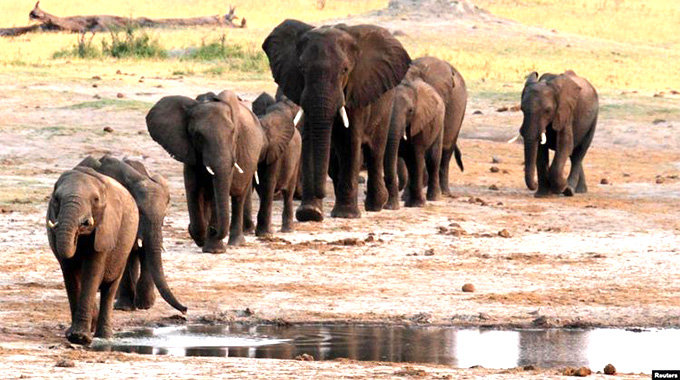
In 2011, under pressure to show that it was serious about tackling poaching and the illegal wildlife trade, Zimbabwe amended its Parks and Wildlife Act to introduce for the first time something called a mandatory minimum sentence.
It dictated that if you were convicted of any of a list of offences including being found with or intending to sell the skin, meat, tusks, or horns of protected species, courts must send you to prison for at least nine years.
On paper, this sounds like a smart idea. Seeing people being sent away for long terms would deter others from committing the same offences, the thinking went.
In fact, Zimbabwe’s mandatory minimum sentences are seriously impeding its otherwise exemplary fight against the illegal wildlife trade, and the practice must be urgently reviewed. Already, it is having a knock-on effect on the country’s ability to prosecute other crimes.
There are three main problems with mandatory minimum sentences. Firstly, they prohibit the authorities from reducing jail terms for accused people if they agree to cooperate.
If someone has been arrested as part of a gang, they could be incentivised by the offer of pleading guilty and being given a lighter sentence to provide details of other gang members, or foreign criminal networks.
That could disrupt international organised crime linked not only to the illegal wildlife trade, but also to smuggling counterfeit goods and medicines, trafficking people, dealing drugs, or moving weapons.
At present, a magistrate may go below the mandatory minimum term in “exceptional circumstances”. But there is no guidance what that means, nor pointers to what sort of lesser sentence might be offered.
Secondly, because minimum sentences discourage guilty pleas, large numbers of wildlife crime cases that would otherwise never go to trial are instead starting to clog up Zimbabwe’s justice system. That slows down all other trials as well.
There is only a one in three chance that you will plead guilty to an offence with a minimum sentence, Space for Giants, the organisation I work for, found in a report on trial outcomes in selected Zimbabwean courts we published earlier this year.
It’s obvious why: rather than be sure of a nine-year sentence, you’d rather try your luck for a better outcome by going to trial. Perhaps witnesses won’t turn up. Perhaps exhibits will get lost. Perhaps the magistrate will get transferred and the case will have to start again.
By contrast, cases without minimum sentences saw guilty pleas 75 percent of the time.
The third reason that minimum sentences are failing is that they end up making ordinary people feel even more antagonised towards wildlife than they used to. Where these laws should encourage a respect for wildlife’s economic and ecological value to Zimbabwe, in fact they are having the opposite effect.
Consider these three cases. In January this year, a man named Molo Mweembe was convicted at Binga Magistrates’ Courts after he was found with two pieces of elephant ivory, and ended up with the mandated minimum nine-year sentence.
At the courts in Victoria Falls, seven Chinese nationals are currently on trial having pleaded not guilty after they were found with 49 pieces of rhino horn weighing almost 21kg. All also face the minimum nine years.
But Philemon Gumbo, a Zimbabwean found with a single python skin, was convicted at Lupane Magistrates’ Court in 2017 under the same laws and received not just the minimum nine-year sentence, but one pushed even longer, to 12 years.
How can people be drawn to support conservation if breadwinners, fathers, and brothers who kill pythons on family backyards are sent to prison for longer than people found with tusks or horns who may be linked to international criminal networks?
What is urgently needed is a review of Sections 128 and 129 of the Parks and Wildlife Act, to remove these mandatory minimum sentences, create higher maximum sentences, and to create binding guidelines on sentencing as a whole.
Prescriptive sentencing guidelines, if introduced, would allow magistrates discretion to sentence at different levels according to strict guidance on the nature of the species, the criminality involved, and the cooperation given.
Some may worry that giving magistrates discretion opens the door to corruption. But provided prosecutors have the right to appeal sentences they find too lenient, or suspect, that risk is mitigated.
Such guidelines could be applied to all crimes, not just wildlife ones. They would lend a degree of proportionality and consistency on sentencing and improve public confidence in the criminal judicial system.
The judiciary itself is already coming around to this view. The High Court in July overturned mandatory nine-year sentences handed to each of three men found in possession of a single live pangolin.
They were instead given three years, and in its judgment the court described the minimum sentence provision as unlawful. This potentially means that every wildlife crime case since the 2011 amendment where a convicted person was given a minimum sentence requires review.
The time to act is now. This week Space for Giants and the Zimbabwean organisation Speak Out For Animals launches with the National Prosecution Authority a legal Rapid Reference Guide designed to make prosecutions even stronger. More and more cases are expected.
Those prosecutions are becoming more complex, and the threat is growing along with greater attention on Zimbabwe from international organised criminal networks involved in the illegal wildlife trade. The rhino horn case involving the seven Chinese men is a pointer of what might be coming.
Scrapping minimum sentences and creating prescriptive and binding sentencing guidelines will allow Zimbabwe to take the lead in tackling the illegal wildlife trade across southern Africa, protect its natural heritage, and remove excess cases from the system to allow other trials to proceed.
Shamini Jayanathan is a criminal barrister and the Director for Wildlife Law and Justice for Space for Giants, an international conservation organisation based in Kenya and operating in eight African countries including Zimbabwe.
